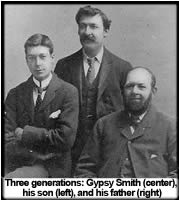 |
Gypsy
Smith (1860-1947)
His
Life and WorkI
By Himself
|
| Introduction
by Rev. Dr. Alexander Maclaren |
|
There is little need for any introduction
to this book, but my friend Gipsy Smith having done me the honour of asking
me to prefix a few words to it, I gladly comply with his request. I have at
least one qualification for my present position, namely, my long and close knowledge
of the man who here tells his life-story, and I can say with absolute confidence
and sincerity that that knowledge has discovered to me a character of rare sweetness,
goodness, simplicity, and godliness, and possessed of something of that strange
attractiveness with which popular beliefs have endowed his race. But the fascination
is explicable on better grounds than magic spells; it is the charm of a nature
which draws others to itself, because it goes out to meet them, and is loved
because it loves.
The life told in this book has its picturesque and its pathetic sides, but is
worthy of study for deeper reasons than these. It witnesses to the transforming
power of Jesus Christ, entering a soul through that soul's faith. A gipsy encampment
is the last place whence an evangelist might be expected to emerge. Almost alien
to our civilisation, with little education, with vices and limitations inherited
from generations who were despised and suspected, and with the virtues of a
foreign clan encamped on hostile ground, the gipsies have been all but overlooked
by the Churches, with one or two exceptions, such as the work of Crabbe half
a century since among those of Hampshire and the New Forest. But the story in
this book brings one more striking and welcome evidence that there are no hopeless
classes in the view of the Gospel. We are accustomed to say that often enough,
but we do not always act as if we believed it, and it may do some of us good
to have another living example of Christ's power to elevate and enrich a life,
whatever its antecedents, disadvantages, and limitations. Gipsy or gentleman,
"we have all of us one human heart," and the deepest need in that
heart is an anodyne for the sense of sin, and a power which will implant in
it righteousness. Here is a case in which Christ's Gospel has met both wants.
Is there anything else that would or could do that?
For another reason this book deserves study, for it raises serious questions
as to the Church's office of "evangelising every creature." Gipsy
Smith has remarkable qualifications for that work, and has done it all over
the country with a sobriety, transparent sincerity, and loyalty to the ordinary
ministrations of the Churches which deserve and have received general recognition.
But what he has not is as instructive as what he has. He is not an orator, nor
a scholar, nor a theologian. He is not a genius. But, notwithstanding these
deficiencies in his equipment, he can reach men's hearts, and turn them from
darkness to light in a degree which many of us ministers cannot do. It will
be a good day for all the Churches when their members ask themselves whether
they are doing the work for which they are established by their Lord, if they
fail in winning men to be His, and whether Christ will be satisfied if, when
He asks them why they have not carried out His commands to take His Gospel to
those around them who are without it, they answer, "Lord, we were so busy
studying deep theological questions, arguing about the validity of critical
inquiries as to the dates of the books of the Bible, preaching and hearing eloquent
discourses, comforting and edifying one another, that we had to leave the Christless
masses alone." This book tells the experience of one man who has been an
evangelist and nothing more. May it help to rouse the conscience of the Church
to feel that it is to be the messenger of the glad tidings, first of all, whatever
else it may be in addition! May it set many others to bethink themselves whether
they, too, are not sufficiently furnished "for the work of an evangelist"
to some hearts at least, though they have neither learning nor eloquence, since
they have the knowledge of One who has saved them, and desires through them
to save others!
ALEXANDER MACLAREN
November, 1901
Back to Table
of Contents

